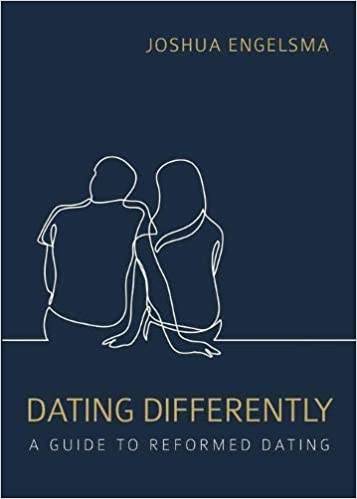A Book Review from Books At a Glance
by Kristin Stiles
As a mother of two young adult children, I was curious to see what a book about “Reformed dating” would have to say. My children have not to this point done any dating, nor are they chomping at the bit to do so, but I thought I’d see if this book would give them any new insight into the topic. After making a cursory glance through the book, I quickly decided that I wanted to read the entire thing because the few paragraphs that initially caught my eye were fascinating and so very encouraging.
Joshua Englesma speaks directly to the teen/young adult. He doesn’t condescend, but he is gentle and persuasive in setting up his arguments for why young Christian men and women need to have a vastly different perspective on dating than the world does. He makes his thesis clear early on: The point of dating is to glorify God. He quickly adds to that: The point of dating is to find a spouse. Both of those reasons immediately put Christian dating (or Reformed dating) in a class far removed from the common reasons young people have to date.
Englesma is already explaining the purpose and sanctity of marriage by chapter 2. He states that too often marriage is not even considered until a couple has been dating for a long time, but that it should be the first consideration before even going out on a first date. He stresses that the single person doesn’t have to limit the field only to candidates that s/he believes would be marriage material, but that the point of dating a person is to determine if that person could be marriage material. Perhaps the young man that didn’t seem like a possible husband shows himself to be of just that caliber when she gets to know him better. Of course, there are guidelines that Englesma shares from Scripture that immediately rule out unbelievers and those who demonstrate marked immaturity or other such traits.
Englesma addresses topics like when to date, what to do on a date, what not to do on a date, how parents should be involved, and how things should progress. He emphasizes the importance of spiritual maturity in assessing readiness to date. He shares sage advice on physical boundaries—possibly the best advice I’ve heard: until you are married, you are to treat the other person as you would treat a literal brother or sister. That does not rule out hand-holding, hugging, or even chaste kisses. If the action elicits arousal, though, it is crossing the line. He puts the onus on the young man to lead in this area and to strenuously protect the chastity of the young lady. In fact, he calls the young man to demonstrate leadership skills in several aspects of the relationship. This is the role he’s called to in marriage, and dating provides an opportunity to practice and see how it is received by the young woman.
Englesma adds a lengthy chapter on singleness, which I greatly appreciate. He acknowledges that it can be a difficult stage of life for someone desiring a lifelong companion. He gives advice on how to know if you have the “gift of singleness” and what to do whether you do or don’t. He gives encouragement and warnings to young people who find themselves in what seems to be a perpetual situation that they may despair of. It is a really excellent chapter.
I am eager to have both my children read this book and I think it would be an excellent resource for teenagers and young adults, but particularly for those who are starting to express to their parents that they want to start dating. I think parents should read this book before their children get to that age. It provides wonderful godly insight into an important area of life that has been so grossly perverted by society. Here is a guide on how to redeem dating and to use it to glorify God and to find a godly husband or wife without bringing the painful baggage of worldly dating into the marriage.
Kristin Stiles is a home-school mom, a Sunday School teacher, and helps lead the “Young, Reading, & Reformed” children’s ministry at Reformed Baptist Church of Franconia, PA.
